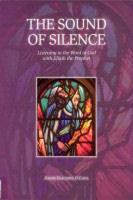
|
Posted October 21, 2009
Book: The Sound of Silence: Listening to the Word of God with Elijah the Prophet Author: Joseph Chalmers, O.Carm. Edizioni Carmelitane. British Province of Carmelites. 2007. Pp. 157 An Excerpt from the Jacket:
Elijah, the prophet of Carmel, was a man of prayer and action who experienced God’s word in the sound of silence. In his own son, Jesus Christ, God spoke in a new way. Many people who encountered Jesus were struck by how he reminded them of Elijah. In this beautiful set of reflections the prophet Elijah is presented to us in the light of Christian faith by Father Joseph Chalmers. As Prior General of the Carmelites (1995-2007), a religious order which draws particular inspiration from Elijah, Father Joseph has shared with people across the world his experience of how God speaks words of love today. Drawing on the ancient traditions underlying the practice of Lectio Divina (holy reading) and Centering Prayer (prayer in secret), Father Joseph shares with us how to listen contemplatively to God’s word in the Bible and in the silence of our hearts. An Excerpt from the Book: According to Saint John of the Cross and Saint Teresa of Avila, detachment is one of the most important virtues of the Christian life. Often we define ourselves by our role: teacher, housewife, religious sister, priest and so on. If we perceive that something is threatening this role, it can be a threat to our whole personality, to our whole world. Detachment means that gradually we become free from disordered attachments to people and to things in order that we might obtain the freedom of children of God, and so tha others can also be free. The word “things” includes many different realities. It includes material things, ideas, feelings, emotions, etc. Material things are good and have been created for the use of everyone but it is very easy to let things enslave our hearts. Saint John of the Cross wrote, “it matters little whether the thread that ties the bird is fine of thick, because it still remains tied until the thread is broken. It is true that the fine threat can be broken more easily; but if it is not broken, the bird cannot fly.” . . . There is a tendency within us to try and possess other people. There is also a tendency to turn people into things in order to feed our needs. Our call is to love others as God loves them because divine love is liberating. People are liberated to become themselves whether this happens to please us or not. As we entrust ourselves to God at various levels of our personality, we can begin to give life to others. Table of Contents: What is Lectio Divina? Reflections The prophet Elijah (1 Kings 17:1-6) At Zarephath Resurrection of the widow’s son The meeting between Elijah and Obadiah Elijah and Ahab The challenge of Mount Carmel I The challenge of Mount Carmel II The end of the drought Elijah on the way to Mount Horeb The meeting with God Vocation of Elisha Naboth’s vineyard Illness of King Acaziah The attempt to capture Elijah The Prophet Elijah returns to God Appendix I – Prayer in Secret (Centering Prayer) Appendix II – Texts in the Old and New Testaments that mention Elijah The Carmelite Family in Britain Carmel on the Web |
|
